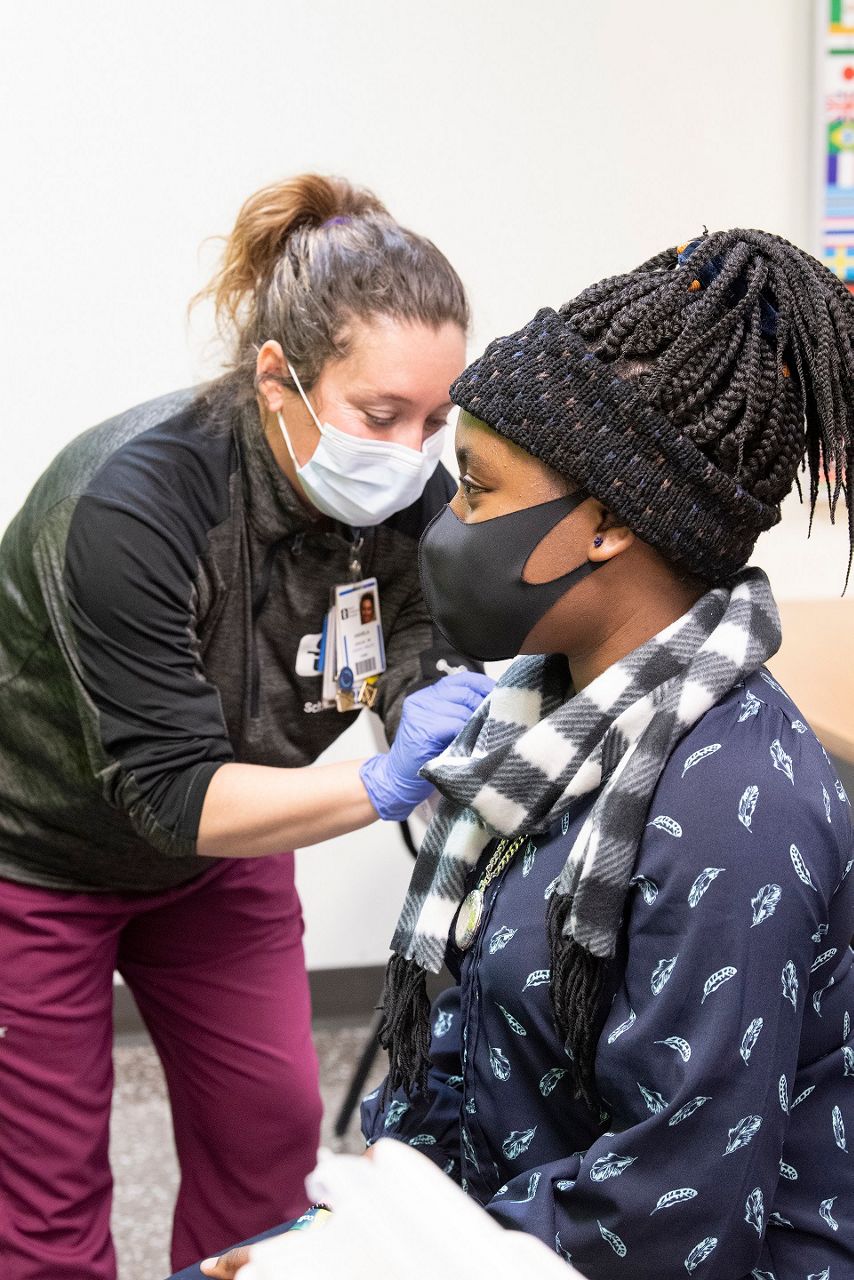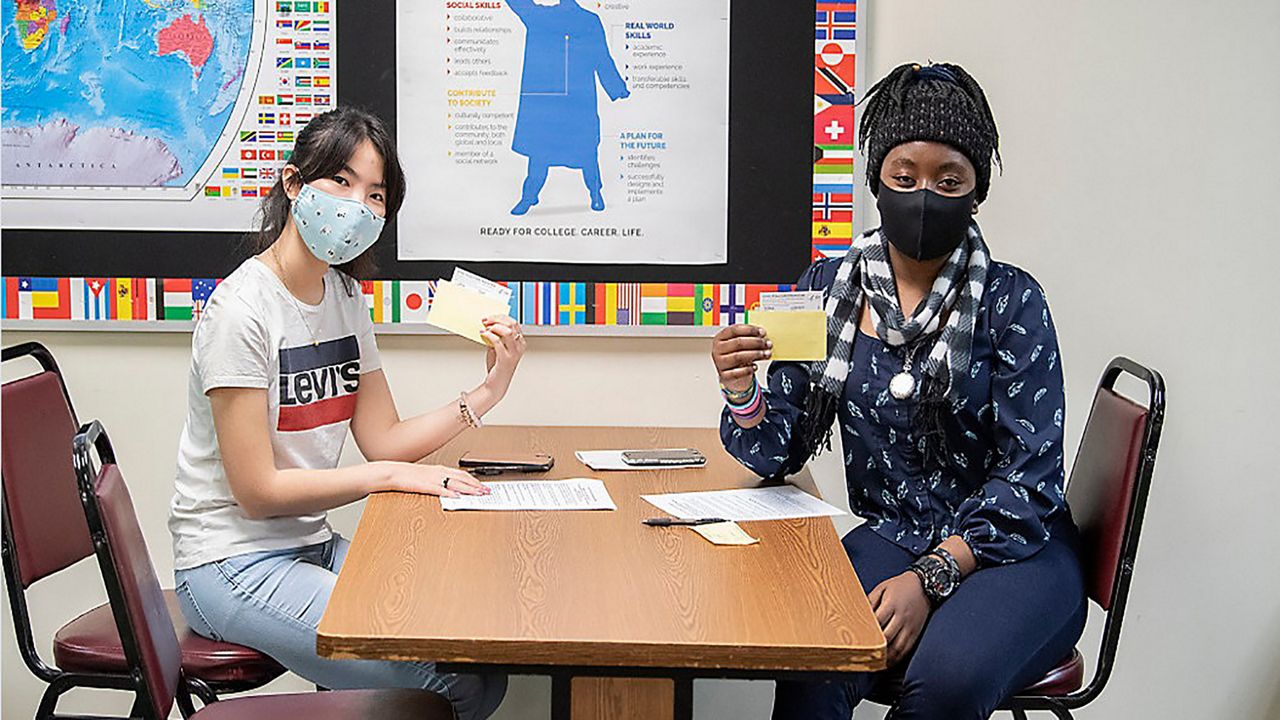AKRON, Ohio — About 80 teenagers, 16 and older, were vaccinated against COVID-19 at North High School on Wednesday. The students took part in an Akron Children’s Hospital teen vaccination program that will roll out at high schools across northeast Ohio over the next several weeks.
The Children’s Hospital vaccination program began hosting the clinics last week, moving from high school to high school, administering first doses of the Pfizer vaccine to the teens.
The two-dose Pfizer is FDA approved for kids as young as 16- and 17-years old, while Moderna can be administered to anyone 18 and older. In the schools, students 16 and 17 need parental permission.
“It’s been a real priority for us to try and get first and second doses in before the end of the academic year for the high school students,” said Akron Children’s Chief Quality Officer Dr. Michael Bigham. “So we're pressing pretty hard to get first and second doses in before that, and we'll be able to achieve that.”
Students are scheduled to get their second shot at Children’s clinics during the last three weeks of the program, beginning May 5 (see list below). Those who attend the later clinics seeking a first dose will be able to come to the Akron Children’s Hospital campus to get the shot if school is out of session when second shots are due, the hospital said. Pfizer doses are given 21 days apart.
The Children’s clinics so far have not been filled, reflecting attitudes of the broader community, Bigham said. He estimates one-third to one-half of the eligible students are getting vaccinated.
“In terms of an uptake rate, or the vaccine acceptance rate, it has been highly variable,” Bigham said. “We’re seeing a little bit of everything.”
Because kids are at lower risk than adults for COVID-19 and many older family members are already vaccinated, some families don’t consider vaccinating teens urgent, Bigham said.
But for families who want their kids to be safe around grandparents or have kids that plan to attend summer camp or play sports, vaccinating teenagers can clear the way for those activities, he said.
Prior to the clinics, Children’s partners with the schools to distribute fact sheets, FAQs and other information, and posts on social media, Bigham said.
“We just want people to be fully informed,” Bigham said. “If they refuse the vaccine, we don't want it to be because we've failed to give them the updated scientific information.”
Ensuring accessibility to the entire community is a priority for Akron Children’s, he said.
“That would include creating really effective ways to improve access to health care that we know to be good, and so this is a real neat mechanism to do this,” he said.

Access to health care is especially important in North Akron, the city’s international neighborhood, where the vaccine permission slips were translated into eight languages for students under 18 to take home to parents.
“We have the chance to reach out to families in their primary language, because we know what those languages are in their school,” Bigham said. “That, we feel, is a real way to improve knowledge and awareness, and thus access to the vaccine. And taking health care to them is just such a wonderful thing.”
One of the 20 languages and dialects spoken at North High is Swahili, the native language of Saraza Byake, 18, who came to Akron from Congo with her family about two years ago. Byake was vaccinated during the clinic on Wednesday.
“I was really excited. I wanted to get the vaccine earlier,” she said. “The other kids were excited, just some of them were nervous because they’re scared of shots.”
The school made sure students had the information they needed about the vaccine, she said, and she would encourage those who are hesitant to be vaccinated, too.
“I would tell them that COVID is really serious and life threatening,” she said. “The best thing is get the vaccine. It will help you in life. It will help your grandmother, you know, your loved ones, your friends, and even yourself.”
A senior, Byake is enrolled in North High’s Akron Children's Hospital Academy of Health & Human Services program.
As a partner in the academy, Children’s dedicates 1,000 hours of time and talent each school year to teaching students about a range of health care professions, and provides hands-on learning opportunities, said Academy Coach Janice Weaver.
“These vaccination clinics are with lots of other schools, but it made it different and special and unique because our students were able to connect the experiences that they've had, guest speakers and job shadows, at Children's Hospital to now,” Weaver said.
Byake, who plans to attend Stark State College to become a nurse, said she paid close attention during the clinic.
“I was watching every single thing,” she said. “Nothing should have been done differently. They were talking to the patient while giving the vaccine and explaining how things will be done. Everything was perfect.”
Akron Children’s high school vaccination schedule:
- April 22 – Bridges AAA, STEM/ Akron Early College, Buchtel
- April 23 – Wooster, Independence and Nordonia
- April 27 – Sebring and Windham
- April 28 – Cuyahoga Falls and Stow
- April 29 – Triway and Ontario
- April 30 – Crestwood and Rootstown
- May 3 – Hudson
- May 4 – Walsh Jesuit and Canton Local
- May 5 – Woodridge and Tallmadge
- May 6 – Woodridge, Tallmadge and Copley
- May 7 – Streetsboro and Kent; Field (first doses)
- May 10 – Coventry
- May 11 – Kenmore-Garfield, East and Ellet; East Palestine (first doses)
- May 12 – North and Firestone
- May 13 – Bridges AAA, STEM/Akron Early College and Buchtel
- May 14 – Wooster and Independence
- May 17 – Nordonia
- May 18 – Sebring and Windham
- May 19 – Stow and Cuyahoga Falls
- May 20 –Triway
- May 21 – Rootstown and Crestwood
- May 24 – Ontario
- May 25 – Hudson, Walsh Jesuit and Canton Local
- May 28 – Field



